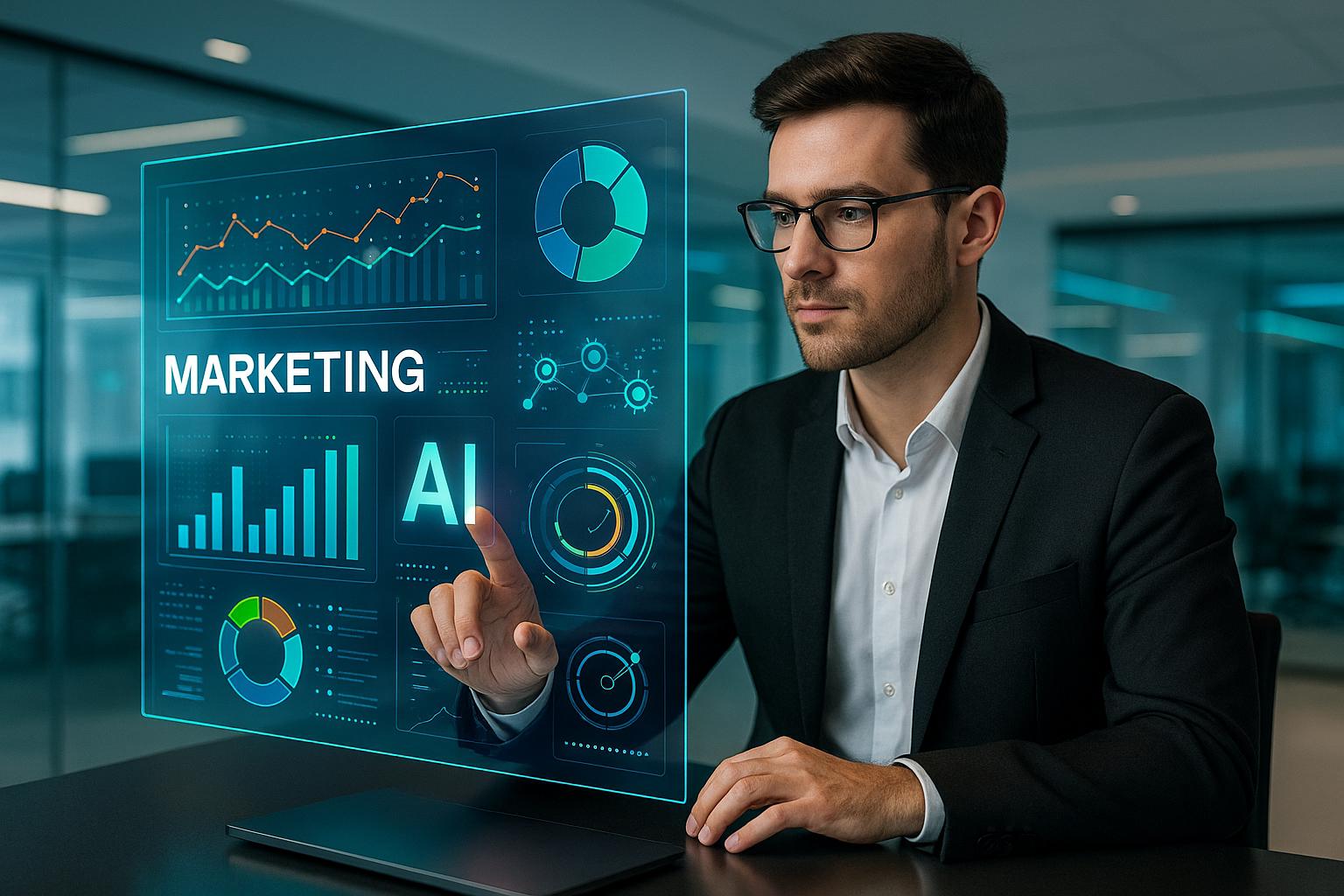Future marketing jobs are changing fast, and AI is leading the way. By 2030, marketers who can combine creativity with AI skills will thrive, while traditional roles relying on manual tasks may disappear. Here’s what’s happening with future marketing jobs:
- AI is everywhere: 88% of marketers already use AI for tasks like data analysis and personalization. By 2030, 70% of companies will rely on at least one AI tool.
- New roles are emerging: Jobs like AI Marketing Strategist, Virtual Brand Manager, and Predictive Customer Journey Analyst will be in demand.
- Old roles are fading: Manual tasks like market research and ad buying are being automated.
- Top skills you’ll need: Data literacy, AI tool proficiency, emotional intelligence, creativity, and strategic thinking.
Key takeaway: Your job won’t be replaced by AI – it’ll be replaced by someone who knows how to use it.
Marketers who embrace AI and stay adaptable will lead the future of the industry.
The Impact of AI: Future Marketing Jobs in 10 Years’ Time
How AI Changes Future Marketing Jobs
Artificial intelligence is reshaping the marketing industry, altering day-to-day operations in ways that are impossible to ignore. By 2025, 88% of marketers will be using AI in their daily tasks, proving that this shift is no longer just on the horizon – future marketing jobs are already here.
This transformation goes far beyond automating routine tasks. AI is fundamentally changing how marketing teams think, strategize, and operate. For instance, 83% of marketers report that AI has increased their efficiency, with nearly half saving 1-5 hours per week. These time savings are not just about doing things faster – they’re about freeing marketers to focus on higher-value work that drives real results.
Let’s dive into the key ways AI is altering marketing roles and the industry as a whole.
Key Changes in Future Marketing Jobs
The future of marketing is being shaped by automation, advanced personalization, and lightning-fast data analysis. These changes are redefining how marketers create value and approach their work.
Automation is eliminating repetitive tasks. AI tools are taking over time-consuming jobs like customer segmentation, competitor analysis, and scheduling content. What used to require hours – or even teams – can now be handled in moments. Andy Jolls, founder and consultant at Roxology, highlights this shift:
“AI is beginning to move beyond solving one-off tasks. In 2025, we’ll start to see AI tackle repetitive workflows, like competitor analysis or audience segmentation, that used to require entire teams. They enable smaller teams to achieve more.”
Personalization is becoming predictive. AI isn’t just tailoring content anymore – it’s anticipating what customers will want before they even know it. This shift is yielding impressive results: AI-powered personalization engines have increased purchase frequency by 35% and boosted average order value by 21%. The demand for tailored experiences is clear, as 91% of consumers say they prefer brands that offer personalized interactions. Marketers are moving from simply creating content to building systems that deliver the perfect message at exactly the right time.
Data-driven decisions are happening in real-time. With AI analytics, marketing teams can make strategic decisions faster than ever. AI has improved decision-making speed by 78%, and predictive analytics have enhanced forecasting accuracy by 47%. This speed advantage allows marketers to react to market trends and customer behavior almost instantly, giving them a competitive edge.
Seamless workflow integration is the new normal. Instead of replacing existing systems, AI is embedding itself into marketing workflows, creating hybrid processes where human creativity works hand-in-hand with AI-powered execution. This integration is reshaping team dynamics and enabling individuals to accomplish more than ever.
New vs. Declining Future Marketing Jobs
As AI takes over routine tasks, traditional marketing roles are evolving or disappearing altogether. At the same time, new, AI-focused positions are emerging to meet the demands of this changing landscape.
Traditional roles on the decline include jobs that rely heavily on manual processes. For example, market research analysts who once spent hours compiling reports are being replaced by AI systems capable of analyzing massive datasets in seconds. Similarly, advertising media buyers are seeing their roles automated as programmatic platforms handle real-time bidding.
| Declining Role | Reason for Impact |
|---|---|
| Market Research Analysts | AI quickly processes large datasets to identify trends |
| Advertising Media Buyers | Programmatic platforms automate real-time bidding |
| Marketing Specialists | AI handles trend analysis, though strategy remains human |
| Content Writers | AI generates content, but creativity and brand voice still require humans |
Emerging roles are being shaped by AI’s capabilities. Positions like AI Marketing Strategists and Predictive Customer Journey Analysts are becoming essential, as they blend technical expertise with strategic thinking. One standout example is the Virtual Brand Manager, a role that combines traditional brand management with AI-driven customer engagement. These professionals must understand both the technical side of AI and the emotional nuances of storytelling.
The content personalization field is also exploding, as generic messaging no longer resonates in today’s crowded market. Grant Ho, CMO of IRONSCALES, underscores this shift:
“In 2025, we will see a reinvestment in brand and top-of-funnel marketing as a response to cutting through the noise, particularly in overcrowded B2B markets.”
The skills gap is creating opportunities. While 4 out of 5 employers prioritize hiring talent with AI expertise, 75% struggle to find qualified candidates. This gap presents a golden opportunity for marketers who can combine AI proficiency with traditional skills.
Human skills are still irreplaceable. Despite AI’s advancements, certain aspects of marketing remain firmly in human hands. Adam Stewart, head of marketing at Genasys, explains:
“AI can give us efficiency and speed, but it lacks the ability to see the bigger picture, interpret non-digital patterns or add the nuance that’s crucial for authentic storytelling. I think any organization that uses AI to eliminate people, rather than make us more efficient and effective, is missing the point.”
A mindset shift is essential. Marketers need to move from execution-focused roles to ones centered on orchestration. Instead of creating every piece of content or analyzing every dataset themselves, they’ll design systems, set parameters, and ensure that AI outputs align with brand values and human insights.
This shift is giving rise to a new breed of marketing professional – one who can think strategically about AI while maintaining the creativity, empathy, and understanding of human behavior that make marketing effective. With 70% of employees believing generative AI will change 30% or more of their work, adapting to this new reality is becoming a necessity.
Organizations that embrace these changes are already seeing the benefits. The global AI in marketing market is expected to hit $47.32 billion by 2025, signaling that companies are heavily investing in AI capabilities and the skilled professionals needed to harness them effectively.
These developments lay the groundwork for understanding the specific skills marketers will need to thrive in an AI-driven future.
Top Future Marketing Jobs for 2030
The marketing world is transforming at lightning speed, creating new opportunities for professionals who can blend traditional skills with AI-driven insights. These future marketing jobs are shaping the future of marketing, enabling businesses to grow through smart automation and data-focused strategies.
By 2030, 70% of companies will use at least one AI-driven tool, and spending on AI-powered marketing and advertising is expected to surpass $100 billion. This shift is opening doors for marketers who can bridge the gap between technology and human creativity. Let’s dive into some of the key roles that will define future marketing jobs in the next few years.
AI Marketing Strategist
AI Marketing Strategists are at the heart of modern marketing teams. These professionals design and execute strategies that use AI technologies to optimize campaigns across various platforms. Their work involves analyzing data, segmenting audiences, and using AI tools to enhance marketing outcomes.
This role requires a mix of marketing expertise and technical skills to ensure AI tools are not just adopted but aligned with business goals. AI Marketing Strategists collaborate with data scientists, machine learning engineers, and marketing teams to deliver measurable results. By 2030, AI will be indispensable for Chief Marketing Officers (CMOs), allowing them to focus on data-driven growth while fostering trust through ethical AI practices.
Content Personalization Architect
As brands move away from generic messaging, Content Personalization Architects are stepping in to create tailored experiences for every customer. These professionals use AI algorithms to craft content that adapts in real time to individual preferences, browsing habits, and engagement patterns.
They develop systems capable of generating multiple personalized versions of a single piece of content, ensuring that each customer gets messaging that feels custom-made. Success in this role demands expertise in dynamic content management systems, behavioral triggers, and real-time personalization algorithms. These architects also need a strong grasp of consumer psychology and storytelling, working alongside UX designers, data analysts, and content creators to build smooth personalization workflows.
Predictive Customer Journey Analyst
In future marketing jobs, simply reacting to customer behavior won’t cut it. Predictive Customer Journey Analysts will use advanced analytics to anticipate customer actions, improve retention, and boost lifetime value. With the global marketing analytics market projected to hit $10.9 billion by 2030, demand for these professionals is on the rise.
Required skills include expertise in automation tools, data interpretation, and the ability to turn insights into strategic direction. Predictive analysts must also stay adaptable and committed to learning as technology evolves. Ethical data practices are critical to ensure compliance with privacy laws while delivering actionable insights.
“To prepare for careers that don’t yet exist, individuals must nurture flexibility, rapid adaptability and insatiable curiosity.” – Frederic Miskawi, vice president at CGI
Their daily tasks include building predictive models, mapping customer journeys, and working with marketing teams to implement data-driven strategies. These analysts act as a bridge between complex data science and practical marketing applications, helping businesses stay ahead in a competitive landscape.
Virtual Brand Manager
The Virtual Brand Manager role combines traditional brand management with cutting-edge AI tools. These professionals oversee brand reputation and customer relationships across digital platforms, using AI to deliver hyper-personalized content and manage real-time interactions.
They utilize tools like AI-powered chatbots and voice assistants for conversational marketing. Emotional AI and sentiment analysis further enhance their ability to craft content that resonates deeply with customers. By 2030, AI is expected to handle 90% of customer service interactions, making these skills a must-have.
A standout example is Identity Digital, which leverages AI to streamline domain management and improve brand positioning. Their tools provide features like intelligent domain recommendations and proactive security monitoring, ensuring a seamless user experience.
“AI is revolutionizing how brands manage their digital identities, empowering companies with powerful tools to create, manage and protect their online presence to build strong, lasting connections with their customers.” – Lisa Box, SVP of Strategic Alliances and Business Development, Identity Digital
Virtual Brand Managers will also need to master technologies like VR and AR personalization tools, deepfake detection systems, and advanced encryption methods to maintain authenticity and privacy. Balancing automation with human oversight will be key to maintaining brand integrity.
Ethical AI Compliance Officer
As AI becomes more integrated into marketing, the role of the Ethical AI Compliance Officer is gaining prominence. These professionals ensure that AI practices are transparent, privacy-conscious, and compliant with legal regulations. They establish ethical guidelines, audit systems for bias, and train teams on responsible AI usage.
This role requires a deep understanding of AI technology and legal frameworks. Ethical AI Compliance Officers work closely with legal teams, data scientists, and marketing leaders to protect consumer rights while enabling innovation. Essential skills include knowledge of data privacy laws, expertise in bias detection, and the ability to translate complex compliance requirements into actionable policies.
These roles highlight the growing importance of balancing technological advancements with ethical considerations in marketing. AI is reshaping the industry, and professionals who can navigate this landscape will help carve out future marketing jobs.
sbb-itb-eb32bf3
Skills Needed for AI-Driven Marketing
To thrive in the evolving world of marketing, professionals need a mix of technical expertise and human-centered skills. Future marketing jobs must leverage AI while maintaining the personal touch that builds genuine connections.
“If you are going into the marketing profession as a refuge from math, that’s likely a mistake. You at least need to be comfortable making decisions based on data, even if you’re not the one collecting or calculating the numbers yourself.” – Mike Moran, Former IBM Distinguished Engineer and Senior Strategist
The best marketing strategies come from a collaboration between human creativity and AI technology. Let’s dive into the essential technical and human skills needed in an AI-driven marketing landscape.
Technical Skills
Data literacy is the backbone of any AI-focused marketing role. Marketers don’t need to be data scientists, but they should be able to interpret analytics, spot trends, and translate insights into actionable strategies.
Proficiency with AI tools is now a must. Understanding how AI works and knowing how to use tools like Copilot, GitHub, Gemini, and GPT can set marketers apart. For context, the prompt engineering market is forecasted to grow at a CAGR of 32.8% between 2024 and 2030, while the large language model (LLM) market is expected to grow at an even faster rate of 79.80% through 2030. Developing familiarity with these tools is crucial for staying competitive.
Automation and workflow optimization skills help marketers focus on strategy by automating repetitive tasks. Mastering tools that integrate AI and machine learning into marketing processes is critical, especially since McKinsey estimates that up to 45% of marketing tasks could be automated.
Basic programming knowledge, especially in Python, is becoming increasingly valuable. Python usage surged by 22% from 2021 to 2022. While marketers don’t need to code extensively, understanding basic programming can help them collaborate effectively with technical teams and grasp the capabilities of AI systems.
Software integration skills are essential for connecting AI tools with existing platforms. This ensures seamless data flow and maximizes the return on marketing technology investments. The ability to integrate these tools into workflows is becoming a cornerstone of future marketing roles.
To get started, marketers should experiment with AI tools in their daily tasks and explore online courses on machine learning to better understand how these technologies work.
Human Skills
While AI can handle technical tasks, human-centric skills remain irreplaceable. Emotional intelligence, creativity, and strategic thinking are critical for building meaningful connections with audiences.
“Understanding and addressing customer emotions fosters authentic connections and enhances loyalty.” – Elena Novikova, Founder and CEO, Lumus Inc.
Emotional intelligence is crucial for understanding customer emotions and creating campaigns that resonate. It’s a skill tied to 58% of job performance, making it indispensable for marketers aiming to build authentic relationships.
Creativity and innovative thinking are uniquely human strengths. While AI excels at recognizing patterns, humans are better at breaking them. This ability to think outside the box is essential for crafting groundbreaking campaigns and exploring new approaches. In fact, 68% of employers prioritize creativity over technical expertise.
Strategic vision allows marketers to interpret AI-driven insights and align them with business goals. This involves seeing the bigger picture, understanding market dynamics, and making decisions that uphold a brand’s identity.
Adaptability and agility are essential in a fast-changing landscape. The demand for “collaborative problem-solving” has grown by 138% since 2021, and 76% of marketers believe agility is key to staying competitive. Flexibility and quick thinking are vital for navigating the unexpected.
Cross-functional collaboration is another critical skill. Marketers need to work seamlessly with data scientists, developers, and other specialists to ensure AI tools are effectively integrated into workflows. This teamwork bridges the gap between technical and creative efforts.
Empathy and customer understanding remain irreplaceable. While AI can process data at lightning speed, it cannot truly understand human emotions or motivations. Brands that connect emotionally with their audience see a 306% higher customer lifetime value.
The balance between technical expertise and human creativity is what defines success in fields like predictive analytics marketing. AI doesn’t replace creativity – it enhances it by providing data-driven insights that fuel innovative strategies.
Continuous learning is key. According to a PwC report, 74% of workers are willing to retrain to remain relevant in an AI-driven economy. Marketers need to embrace lifelong learning, refining both their technical and interpersonal skills to stay ahead.
The future belongs to marketers who can build feedback loops where AI insights inform creative strategies. This collaboration between human intuition and machine intelligence will shape careers in content personalization and other emerging marketing roles.
Future Marketing Jobs: Challenges
AI-enabled marketing is reshaping the industry, but it comes with its own set of hurdles for professionals and organizations. While the potential for transformation is massive, navigating the changes may be tricky.
A striking 57% of marketers report feeling pressured to grasp AI technologies. This sense of urgency often leads to anxiety, as many question whether their current skills will remain relevant in a world where AI is taking on more tasks. Addressing these challenges is critical to unlocking the opportunities that future marketing roles promise. Among the most pressing concerns are balancing customer privacy with personalized experiences and the urgent need for workforce training.
“AI will inevitably replace certain aspects of traditional marketing, but by and large, it will probably be the tedious, mundane tasks, like analytics, that most of us aren’t enthusiastic about anyway.” – Mike Maynard, CEO at Napier
Organizations also face systemic obstacles. While 89% of companies acknowledge the need for AI-related skills, only 6% have made meaningful strides in upskilling their teams. This gap underscores the challenge of translating awareness into action. Additionally, quality control is a persistent issue, as AI systems can produce inaccurate or biased content. Data bias alone has the potential to cause revenue losses of up to 62%.
The rapid pace of AI advancements only adds to the complexity. For those working in content personalization, staying informed about emerging trends is essential to maintaining performance, yet it can feel overwhelming.
Data Privacy vs. Personalization
AI has revolutionized personalized marketing, but it has also brought privacy concerns to the forefront. Striking the right balance between personalization and respecting customer privacy is one of the industry’s toughest challenges. While 44% of consumers express frustration when brands fail to deliver personalized experiences, a significant 70% are uneasy about how their data is being collected and used. Trust plays a pivotal role here – 75% of consumers say they won’t buy from a company they don’t trust with their data.
“There are more and more privacy regulations coming into play that are designed to protect the way consumer data is used, how brands have access to the data, and how they might share the data.” – Rusty Warner, Vice President and Analyst, Forrester
The financial risks of ignoring privacy regulations are steep. GDPR fines have exceeded €1.7 billion, with high-profile cases like British Airways’ £20 million penalty and Facebook’s $5 billion FTC fine showcasing the consequences. Beyond monetary penalties, the reputational damage from non-compliance can be even harder to recover from.
“Non-compliance with laws like GDPR or CCPA can cost companies millions, but the reputational damage is even harder to repair. A proactive approach to data governance is no longer optional – it’s a business imperative.” – David Lewis, VP of Data Strategy, SecureSync
For roles like virtual brand managers, the challenge lies in balancing the need for automated personalization with strict privacy regulations. AI systems rely on vast datasets, making it imperative to ensure compliance while delivering tailored experiences.
“As a marketer, you want to push the boundaries to create highly personalized campaigns, but regulatory constraints mean every decision has to be vetted.” – Raj Mehta, Digital Marketing Head, Multinational Retail Firm
Thankfully, technology offers solutions. Businesses adopting advanced AI-based data anonymization techniques have seen a 30% improvement in personalization accuracy while safeguarding privacy. Federated learning, which trains models on decentralized data, reduces the need for data transfers, offering another layer of protection. Transparency is also key – 92% of consumers are more likely to trust brands that clearly explain how their data is used.
“Personalization and privacy are often seen as opposing forces, but they don’t have to be. The key lies in transparent communication and the ethical use of AI. Brands must show consumers the value they receive in exchange for their data.” – Mary Chen, Chief Data Officer, DataFlow Inc.
Training the Workforce
Bridging the skills gap in AI marketing is another critical challenge. Executives estimate that 40% of the workforce will need reskilling within the next three years. While 85% of marketers have already updated their skills to keep pace with AI, individual efforts alone won’t suffice. Companies need structured, strategic approaches to workforce development.
The challenge goes beyond technical skills. In the U.K., 34% of employees lack the human skills necessary to collaborate effectively with AI tools. Building a workforce ready for AI requires training programs that focus on both technical and interpersonal competencies.
For smaller orgs, resource allocation adds another layer of difficulty. It’s a struggle to juggle the demands of privacy regs, AI implementation, and day-to-day operations.
The fast-paced evolution of AI tools can also overwhelm employees, making continuous learning essential. Personalized training programs tailored to specific roles – such as content personalization versus traditional advertising – are crucial. Companies must encourage ongoing learning, with leaders actively participating in training and peer-to-peer knowledge sharing.
Though investing in comprehensive training requires significant time and resources upfront, the long-term benefits are undeniable. A well-trained workforce not only boosts efficiency and innovation but also helps retain top talent, ensuring organizations remain competitive in an AI-driven future.
Preparing for Marketing’s Future
AI-driven marketing isn’t just on the horizon – it’s already here. With projections showing that over 450 million workers will need upskilling by 2030 and 70% of job skills expected to shift during that time, marketers face an urgent call to action. To stay relevant, they must embrace new skills tailored to the changing demands of their field.
But here’s the good news: you don’t need to start from scratch. As LinkedIn’s Chief Economist Karin Kimbrough puts it:
“AI is powerful, but it is best suited to assist marketers rather than replace them”.
The challenge lies in learning how to collaborate with AI effectively, not compete against it.
Building Your AI-Ready Skill Set
Thriving in the marketing world of tomorrow requires blending technical know-how with distinctly human abilities. Start by building AI literacy – learn how to brief, prompt, and refine AI tools. Dive into areas like data analysis, basic programming, and problem-solving, and explore AI-powered learning platforms to enhance your technical skills.
At the same time, focus on what machines can’t replicate. Skills like strategic creativity, understanding customer behavior, and forging strong relationships remain critical. As Kimbrough aptly says:
“The future of marketing is not less human – it’s more human”.
Transitioning to Emerging Roles
Shifting from traditional marketing roles to AI-enhanced positions requires a change in mindset. Instead of focusing solely on task execution, think about orchestration – letting AI handle repetitive tasks so you can focus on strategy and creative leadership. This approach mirrors the broader transformation happening across the industry.
Companies are already mapping existing roles to new AI-enabled opportunities. For example, a content marketer could transition into a career centered around content personalization, while brand managers could evolve into virtual brand managers by mastering AI tools.
Once you’ve built a foundation of technical and interpersonal skills, it’s time to reposition yourself. Create a structured learning plan to steadily grow your expertise. Start with beginner-friendly AI tools and gradually move to more advanced systems as your confidence grows.
Staying Ahead of the Curve
With 87% of marketers already using or experimenting with AI tools, getting a head start is essential. Keep an eye on emerging trends, such as generative content and voice search optimization. Experiment with AI tools to understand their strengths and limitations.
Develop “meta-skills” – abilities that help you adapt to new technologies as they emerge. These include learning how to learn, staying curious about new advancements, and quickly mastering unfamiliar tools. Christina Inge, author of Marketing Analytics: A Comprehensive Guide and Marketing Metrics and instructor at Harvard’s Professional & Executive Development program, emphasizes:
“Your job will not be taken by AI. It will be taken by a person who knows how to use AI”.
The goal is to complement AI’s capabilities while maintaining the creativity and critical thinking that only humans can provide.
Taking Action Now
The pace of change is accelerating. By 2030, the number of people using AI tools is expected to more than double, from 314 million today to roughly 729 million. Start by identifying how your current skills align with future marketing roles. For instance, content creators might shift toward careers in content personalization, while data-driven marketers could explore predictive analytics.
Your existing skills aren’t outdated – they’re the foundation for your AI-enhanced career. Flexibility will be your greatest asset in navigating an unpredictable job market. By combining AI expertise with human creativity, you’ll position yourself to thrive in the next era of marketing. Adapting today ensures you’ll stay ahead tomorrow.
FAQs
What skills will marketers need to succeed in an AI-driven marketing world by 2030?
To succeed in the AI-driven marketing world of 2030, marketers will need to balance technical expertise with creativity. One key skill is data literacy – being able to interpret and use tools like predictive analytics to forecast customer behavior and create campaigns that truly resonate.
At the same time, flexibility and the ability to think creatively will be critical. As AI continues to evolve, marketers must adapt by finding ways to incorporate these tools into their strategies while still producing content that connects on a human level. Additionally, a strong focus on ethical practices will be indispensable. Using AI responsibly – while maintaining transparency and building trust – will set the foundation for meaningful consumer relationships.
Mastering these skills will ensure marketers stay competitive and relevant as the industry transforms.
How can marketers use AI for personalization while ensuring customer privacy and trust?
Marketers can strike a balance between AI-driven personalization and customer privacy by focusing on three essential strategies:
- Be upfront and clear: Let customers know exactly how their data is collected, stored, and used. Being open about these practices not only builds trust but also ensures compliance with regulations like GDPR and CCPA.
- Rely on first-party data: Use information that customers willingly provide, rather than depending on third-party cookies. This method allows for tailored experiences while respecting privacy boundaries.
- Keep human oversight in place: Regularly monitor AI systems to avoid bias or overly invasive approaches. Having people involved helps maintain ethical standards and ensures the technology aligns with customer expectations.
By following these steps, marketers can create personalized experiences that protect privacy and build lasting trust with their customers.
How can organizations close the skills gap and prepare their marketing teams for the future of AI-driven marketing?
Organizations can address the skills gap and prepare their marketing teams for the evolving world of AI-driven marketing by focusing on specialized training programs and promoting a culture of ongoing learning. This means helping employees build expertise in areas like AI tools, predictive analytics, and content personalization, so they can confidently use these technologies in their work.
Here’s how businesses can make this happen:
- Offer training on AI basics, including machine learning and natural language processing, to build a strong foundation.
- Provide opportunities for hands-on practice with AI-powered marketing platforms to boost familiarity and confidence.
- Encourage teams to integrate AI tools into their daily tasks, fostering adaptability and a forward-thinking mindset.
By giving marketing teams the skills and mindset needed to embrace new technologies, companies can stay competitive and ready for the future in an AI-driven marketing landscape.





